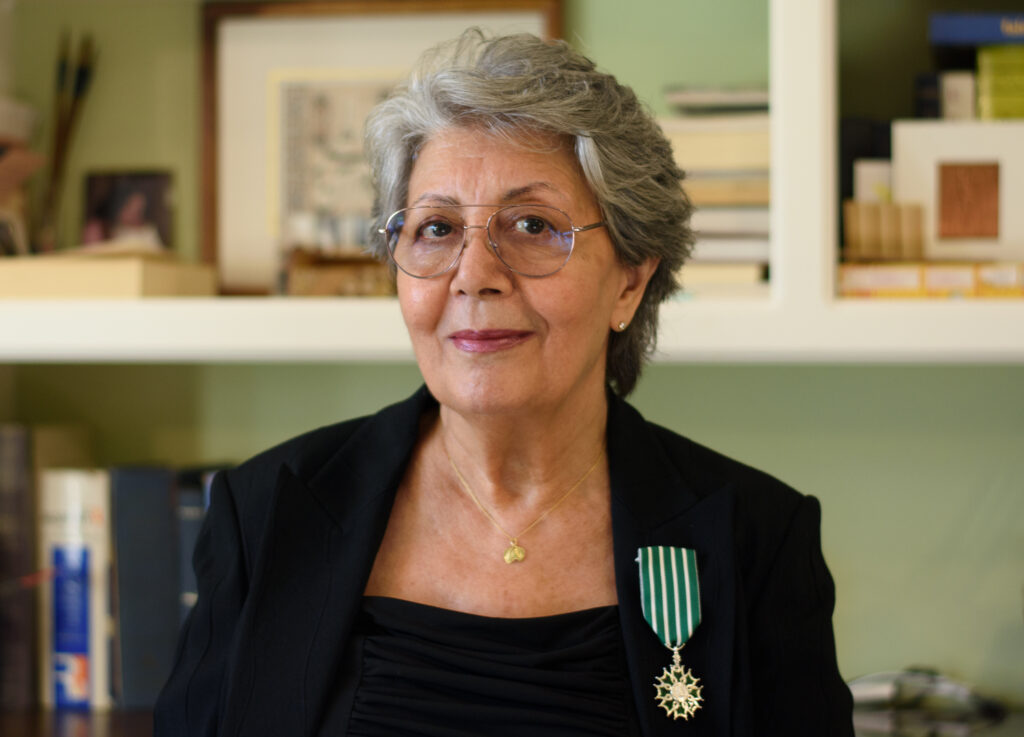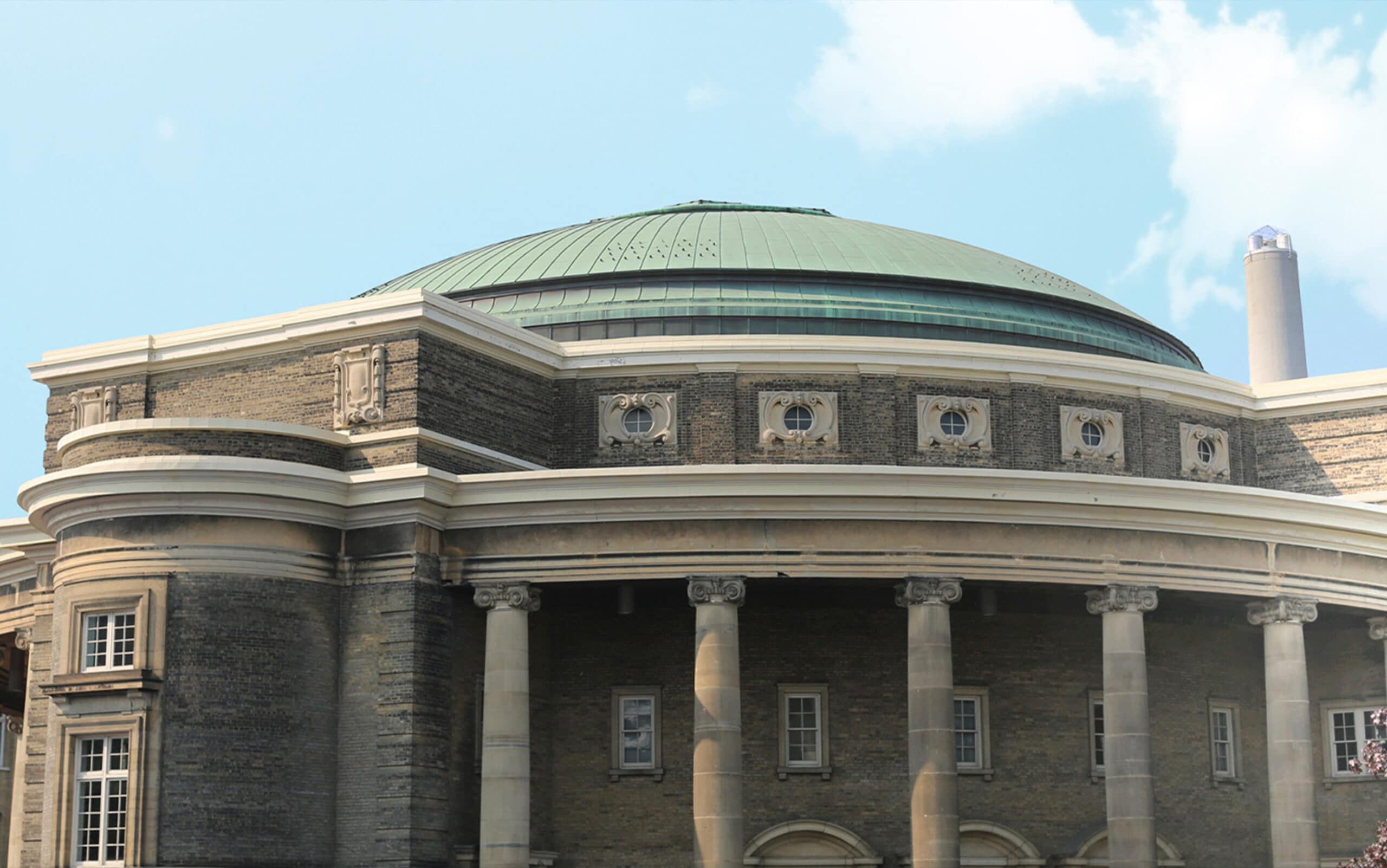U of T receives US$6 million to establish the Elahé Omidyar Mir-Djalali Institute of Iranian Studies
The endowment from Roshan Cultural Heritage Institute will greatly expand the field of Iranian Studies at the University of Toronto.

Photo by Gunner Omidyar
With a storied history reaching back 10 millennia, Iran is one of the major cradles of civilization. Its achievements in the arts and sciences have profoundly uplifted human culture through the ages.
Now, with a generous endowment of US$6 million from Roshan Cultural Heritage Institute, the University of Toronto is launching the Elahé Omidyar Mir-Djalali Institute of Iranian Studies, which is named after the scholar and philanthropist who founded Roshan Cultural Heritage Institute in 2000. The new institute will focus primarily on research and outreach by leveraging the strong educational programming already in place across the University of Toronto, fostering advanced research in a collaborative community, and promoting intercultural dialogue.
“The University is delighted to partner with Roshan Cultural Heritage Institute in this new initiative to further interdisciplinary scholarship in Iranian Studies,” said Meric Gertler, U of T’s president. “We look forward to a rich cultural exchange not only between scholars across our departments and around the world, but also with Toronto’s vibrant Persian diaspora.”
“I extend our sincerest thanks to Dr. Mir-Djalali for her generosity and for the opportunity to broaden our links with the Iranian community and to deepen the wider public’s understanding of this remarkable civilization.”
A world-leading program to support studies in Persian culture
“We are honoured to establish the first research institute for Iranian studies at the University of Toronto, home of one of the largest and best clusters of faculty, post-doctoral fellows and students in the field in North America—if not the world. I personally am proud for the opportunity to advance the knowledge and appreciation of Persian culture through this new Institute and am inspired for the positive impact it will have on generations of students and scholars in Canada and the world for years to come,” said Mir-Djalali.
Through its grant-making operations, Roshan Cultural Heritage Institute has provided millions of U.S. dollars in grants and endowments to establish or strengthen academic Persian programs at some of the most prestigious universities in the world.
Mir-Djalali is an expert in language education, cross-cultural communication and Persian studies; and is widely recognized for her pioneering efforts in nurturing the next generation of Persian studies specialists. Born in Iran, she received a doctorate in linguistics from Paris-Sorbonne University and was a faculty member at Georgetown University and the University of California at Berkeley. In 2018, Mir-Djalali was honoured by the French Ministry of Culture with the title of Chevalier de l’ordre des Arts et des Lettres—one of France’s most prestigious awards—in recognition of her lifelong and significant contributions to Persian arts and culture in France and around the world.
A tremendous opportunity to further cross-cultural understanding and exchange
With investments allocated over a multi-year period, the generous endowment from Roshan Cultural Heritage Institute will significantly expand the University’s prestigious Iranian Studies program in several ways.
- Providing substantial support for a world-leading scholar who will serve as the Elahé Omidyar Mir-Djalali Institute’s director
- Launching a regular lecture series and international conference to facilitate exchanges and discussions for the academic community
- Enhancing the graduate experience by awarding annually up to two Dissertation Completion Fellowships to top doctoral students in Iranian-related studies; and at least two Graduate Scholarships to pursue Persian language training abroad, participate in conferences or conduct research in the field
- Establishing a two-year Post-doctoral Fellowship to enable recently graduated PhDs to deepen their expertise in Iranian Studies and further their own research at the University
- Launching the Scholar Award program for tenure-track U of T faculty members in Iranian studies to assist them in compiling successful tenure files
- Engaging the public and bringing focus to the richness of the Iranian culture by hosting annual cultural programs celebrating Persian holidays
“The Elahé Omidyar Mir-Djalali Institute of Iranian Studies is a tremendously exciting initiative,” said Melanie Woodin, dean of the Faculty of Arts & Science at U of T. “This wonderful gift offers new opportunities to build on our dynamic Iranian Studies program, to attract groundbreaking new scholars, to add to U of T Libraries’ extraordinary holdings in Persian literature, to diversify our interdisciplinary collaborations and to share our remarkable work with the global community. We envision nothing less than the chance to fundamentally transform the field. We are so grateful to the Roshan Institute for recognizing the strength of Iranian studies at U of T.”
“Dr. Elahé Omidyar Mir-Djalali has been an exemplary colleague of mine since the 1990s,” said Mohamad Tavakoli-Targhi, a U of T professor of History, Historical Studies & Near and Middle Eastern Civilizations. “As a linguist, she is an advocate of original and rigorous academic research. Encouraging transdisciplinary dialogue in Iranian Studies, she has particularly inspired her colleagues to reflect critically on the analytical categories that shape our research.
“The Elahé Omidyar Mir-Djalali Institute for Iranian Studies is a tremendous development for the University of Toronto. It will foster collaborative transdisciplinary research by faculty and students working on all aspects of Iranian history, literature, languages, and arts across the University of Toronto’s three campuses. This endowment will establish the University of Toronto as an unrivalled site of scholarly excellence and innovative scholarship on Iran. I am grateful for the Roshan Cultural Heritage Institute’s generosity and for the critical support provided by the University of Toronto.”
Building a cultural hub benefits the University and the wider community
The Elahé Omidyar Mir-Djalali Institute’s mandate to foster collaboration and cultural appreciation will be enhanced by its location at 90 Queen’s Park, the new cultural and academic hub currently under construction at the University. The state-of-the-art research and teaching facility, nestled between two highly respected museums, includes a 250-seat event space and an inviting garden plaza steps from the subway.
Here, U of T scholars—more than 18 leaders in the field of Iranian Studies—will work alongside those from the School of Cities, the Faculty of Music, the Institute of Islamic Studies and the departments of History and Near and Middle Eastern Civilizations. They will also have opportunities to connect with U of T’s outstanding network of researchers, across three campuses, and collaborate with Toronto’s lively and growing Iranian community in the heart of one of the world’s most diverse cities.
“Providing global leadership among scholars and lovers of culture depends on the support of far-seeing, committed philanthropists such as Dr. Mir-Djalali,” said David Palmer, U of T’s Vice-President, Advancement. “We’re enormously grateful for the generous vision that makes exciting initiatives like the Elahé Omidyar Mir-Djalali Institute possible, and delighted to welcome Roshan Cultural Heritage Institute as friends and partners.”
Roshan Cultural Heritage Institute is dedicated to the promotion and celebration of Persian culture. Though the private foundation has already supported several Persian-related initiatives at U of T, this new grant marks its first campus endowment, with the aim to encourage a broader understanding of Persian civilization through the study of the arts, language, philosophy, spirituality and social events.

